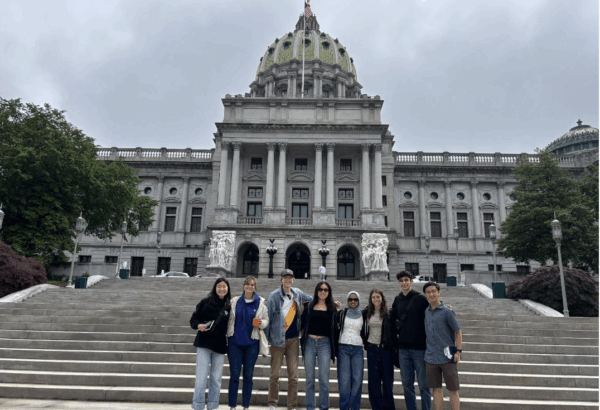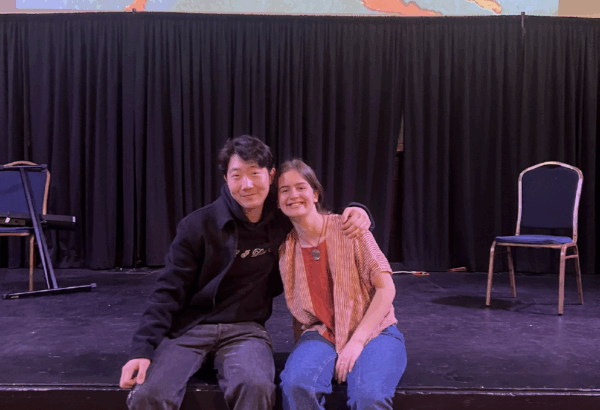In order to be a well rounded public interest technologist, you need to be a well rounded person. See the world, see what people are up to, and bring those perspectives to everything you do with a sense of humility and openness. Don’t impose your own views on things, but really take the time to listen and see what is going on out there.
—Peter Bloom
Edited transcript below.
Route to Public Interest Technology
Nikki: Peter, could you start off telling us a bit about your work and what your job entails?
Peter: My work is basically at the intersection between community organizing and telecommunications. I work with an organization that I helped to start approximately 10 years ago called Rhizomatica and we work with communities around the world to build telecommunications networks. We primarily work in places that don’t have existing coverage or connectivity in indigenous communities, so we help communities build networks that they own and manage. We also help those communities advocate for more inclusive telecommunications policies and regulations.
Nikki: How did you become involved in your field and how did you get to where you are today?
Peter: It’s been a circuitous route. I have a bachelors from Penn in Urban Studies. That helped me understand how people organize themselves and how we can advocate for social justice. That was the biggest relationship between my formal education and what I do. I also now have a Masters degree in rural development.
I was working with different communities around the world who were using cell phones to document different things that were happening to them. Human rights abuses, environmental rights abuses, etc., and we got to a point where it seemed like we needed to figure out how to have our own infrastructure, our own way of passing information around that didn’t rely on commercial networks, that’s how it started. With some projects in Nigeria, previous work that I’d done in Philadelphia with immigrant communities, and then also in Mexico, where our most important projects are working with community radio stations and other communities who were just figuring out how to get connected and use the power and the tools of their telephone or the Internet to advocate for their rights.
Nikki: You touched on this a bit, but how has your career path changed over the years?
Peter: Even while I was at Penn I was involved in organizing work. I started a nonprofit in Philadelphia called Juntos, which is still working on immigrant rights in South Philly. I’ve always tried to keep that my guiding star, the idea of social justice, working with communities to solve local problems. Technology, connectivity, cell phones, all started becoming a big deal in everybody’s life about 10-15 years ago. And it just seemed like a good kind of fusion. A good way to use these new tools that were evolving and link it together with the social justice work that I was doing in different places. So in that sense, my career has been a straight trajectory but adding the public interest technology component was something that definitely took me into a whole new realm.
It’s very easy to get sucked into conversations about the technology itself and assume that it’s going to do good. It is very hard sometimes for technologists to speak with communities that don’t interface as much with technology. How to bridge between two worlds, indigenous communities, unconnected communities, underdeveloped communities, and the world of technology. That is what I’ve tried to bring to the table and not forget.
—Peter Bloom
Bridging two worlds
Nikki: You mentioned your North Star. Could you talk more about what orients the direction you want to take your career?
Peter: Trying to focus on working with people, especially around technology. It’s very easy to get sucked into conversations about the technology itself and assume that it’s going to do good. It is very hard sometimes for technologists to speak with communities that don’t interface as much with technology. How to bridge between two worlds, indigenous communities, unconnected communities, underdeveloped communities, and the world of technology. That is what I’ve tried to bring to the table and not forget.
Nikki: The idea of bridging two different worlds. How has it been difficult for you to become established in this field, or what challenges have you faced along the way?
Peter: Certainly in the technology space, we are coming with a different perspective that most other people so it has taken several years to get our ideas to the table.
Another challenge includes doing innovation in under-resourced contexts. It is hard to raise money. It is hard to do technology as a nonprofit, to keep up when on one side you have people with billions of billions of dollars developing technology for very specific use cases that are massive in scale, and then you have other folks like us trying to develop technology for indigenous communities in the Amazon rain forest who are in a completely different reality most of the time. There is not a path to billions of dollars in terms of what we’re doing, and that’s not what we’re trying to do. So how do you raise the funds? How do you get talented people to work on the project when you’re in the shadow of these much larger efforts?
Experiential Learning and Public Interest Technology
Nikki: Looking back at your undergraduate years at Penn, did you participate in any activities that led you to work in the public interest sector?
Peter: At Penn, I didn’t exactly envision I’d be doing this. I didn’t take any engineering or computer science classes and I’m actually not particularly technically minded. Urban studies was a great fit for me because it allowed me to pursue a lot of the social justice work that I was doing. I started the social justice work first and then decided on majoring in urban studies as it gave me the most flexibility. Beyond that, I was exposed to a lot of ideas and things that were incredibly helpful as I was doing my work in Philadelphia. Penn provided me with the tools to do it better.
Nikki: What advice would you give to undergraduates who are considering going into the work you are doing or in general careers in public interest technology and policy?
Peter: My first piece of advice is to do it, take the leap. I think it’s a super interesting time for technology and also a concerning time for the world in a lot of ways. Think about the big problems we’re facing in the world right now, global warming, racial justice, etc. It is hard to deny their importance in our society, both in the United States and elsewhere. Technology can play a role, and is currently playing a somewhat negative role, so how can we turn the tables? How can we actually ensure that technology helps us solve the problems of the world and not create more problems?
Having people who can engage with the technology side as well as the social side is incredibly important. Having a solid educational foundation and experiential learning to be able to take a more well rounded approach to these issues. In order to be a well rounded public interest technologist, you need to be a well rounded person. See the world, see what people are up to, and bring those perspectives in everything you do with a sense of humility and openness. Don’t impose your own views on things, but really take the time to listen and see what is going on out there.
Solving Contemporary Problems with Technology
Nikki: How is public interest technology connected to current issues? What do you think public interest tech is so important and why should people care?
Peter: I think technologies play such an outsized role in our lives. And now with Covid-19, even more so. I think there’s a lot of questioning that has to happen about where we’re going as a society, and was a sort of a technologically driven society, we need people to be able to ask those questions and demand answers that are sufficiently detailed and clear and reasonable. We haven’t fully grappled with the larger societal questions of the technologies that surround us. How do we amplify the good and mitigate or reduce the harm? If you look at the history of human development, there’s always an aspect of technology to the changes we experience but I think with the rise of the Internet and the interconnection we have around the globe there’s been an acceleration of the role of specific technologies in shaping society.
Nikki: How has your work shifted during the pandemic?
Peter: Most of my work happens over teleconferencing or zoom because I work with people all around the world. In that sense, the transition hasn’t felt that strange. It has been the ability to go and visit communities that has become more difficult. We’ve found ways to do it, and we have been doing it, but it’s a lot more clunky with all the protocols. The pandemic has raised a lot of awareness, both on the side of the people who are connected and want to help people who aren’t connected and on the side of people who aren’t connected wishing to be connected. The importance of doing it properly. The work has become a popular topic over the past few months.
Nikki: Reflecting on your career so far, what would you say is a project or multiple projects that you are particularly proud of?
Peter: I participated in building this indigenous owned and operated cellular network in Mexico. That’s a project that has been going on for the last eight years and has gone through many iterations. I am proud of it because of the perseverance it has required. I think that’s an important aspect of this conversation too, is that Rome wasn’t built in a day. Things take time and even if you are failing at the beginning by learning from that failure it will help you to be successful later. I am proud of the perseverance and the ability to learn and adapt over time.
Nikki: What is next for you?
Peter: I was supposed to be on sabbatical and then the pandemic happened and I kept working. I’ve been spending more time trying to reflect on the work that we do and write and publish. We have a lot of projects going on at work with a ton of people on different projects. I can be in meetings all day. I need to have time to recharge and reflect on what I’ve done over the past decade. Also, try to gain a better understanding of where the industry moving. Where the regulation and that kind of thing is moving. This takes time.
We have some really exciting stuff that we’re doing in South America in the Amazon. A lot of my time is spent on that project. Hopefully soon I will get to go to some really cool places and work with some amazing people who are defending some of the last natural places on Earth. The weight of that and the responsibilities of both daunting but also reassuring, somehow, that we’re doing something important.
Nikki: We’re looking forward to seeing what you do in the future and the next amazing projects that you work on.



